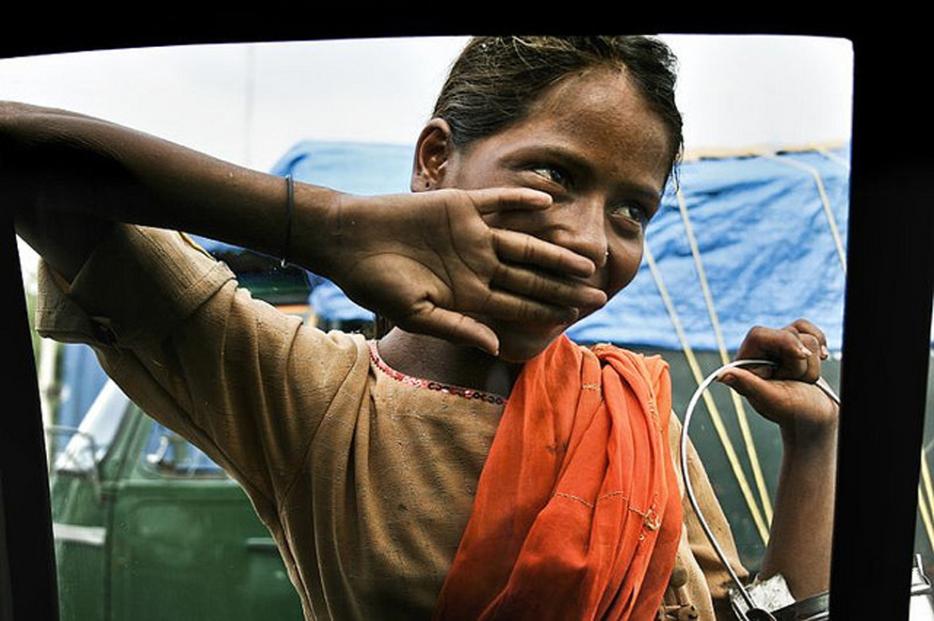In a scene from Shauna Singh Baldwin’s The Selector of Souls, Damini, a Hindu midwife in India, goes through the motions of stirring sugar cubes into her tea knowing the sweetness will leave no trace on her tongue. Baldwin writes, “She lost her sweet tooth a year and a half ago on a December day when she saw Suresh on TV. There was her son—or someone just like him—at the birthplace of Lord Ram in Ayodhya, clambering up the half-demolished sides of a masjid.”
Search “Babri mosque destruction” on Youtube and you’ll be met with hundreds of results. The short, faded videos are frenetic snatches of a day back in 1992, in the city of Ayodhya, that many Indians say signalled a change in India’s political and social culture. That moment pointed to the rise of Hindu supremacy and the idea that Hinduism is India’s only legitimate faith. Religious minorities and moderate Hindus suddenly found themselves outside the dominant narrative. It is on that day that sweetness is stolen from Damini’s life.
Baldwin’s complex novel—her first in seven years—brings together the stories of Hindu Damini and Christian Anu—two women looking to make a place for themselves against the backdrop of increasing chauvinism in a time when Gandhi’s vision of a plural India was looking more like an abandoned dream.
In terms of some of the themes you’ve been coming back to, sometimes people will have certain expectations of a writer to do something different, how much of that is a compulsion for you? Do you feel like you still have a long way to go in terms of talking about India and women’s voices?
I think I do keep returning to issues that are still problems in the world. Feminism and fundamentalism are going to be problems for a long time. Sometimes we think we’ve solved them but they come back, and in terrible ways. I have been writing about Aryan supremacy as expressed by Hindu fundamentalists in this book and then a month ago there was a shooting in Wisconsin at my gurdwara (a Sikh place of worship). So it’s difficult to say these problems happen overseas and don’t happen in North America. Feminism is a dirty word in some quarters and many values I hold dear—multi-culturalism, diversity—are anathema to many people, and until that’s solved I’m going to keep on writing.
Tell me about the shooting at the gurdwara. How did that day unfold for you?
I was dressing to go to the gurdwara, and my husband got a call from a friend, who said, “Turn on the news.” We heard there was a shooting and raced to the gurdwara as fast as we could but by the time we got there, the police had blocked the streets. I asked to be let in as a Red Cross translator, and we went through. We spent 5 hours camped across the street from the gurdwara in the parking lot of a bowling alley, waiting for news. We didn’t know if there were four gunman as reported initially, or 40. We had no idea if there were hostages taken inside. And everyone kept asking and speculating, “Why?”
So much of the initial reporting was trying to understand “who” the Sikh community was. Why the wide-eyed bafflement about who are these people? I was surprised to see that tone in the coverage. If it is somewhat an invisible minority in the United States, how do you think that Americans, white Americans, are processing that attack?
There was an outpouring of solidarity even before non-Sikhs realized that the people behind the counter at their corner grocery, or driving taxi cabs, or the owners of gas stations, or whose men wear turbans are named Sikhs. It didn’t matter what we are called, or what religion we are. The great thing about Americans is that most have this idea that everybody has a right to be different. The problem lies with the tiny percent who believe you don’t have a right to be different. So I would say most of the people were with us. In fact it was heartwarming, how non-Sikhs attended the vigils and funerals and spontaneously made grave markers. Of course Sikhs don’t have graves, but non-Sikhs made little crosses and then decided the crosses were wrong and made circles around the crosses—they were just trying to express solidarity. I remember standing next to a 20-year-old dressed in a goth outfit with crosses all over her and she threw her arms around me and wept. We were all crying together realizing we couldn’t have prevented the shooting. The only thing Sikhs could have done differently was to be someone different, and that’s pretty difficult.
That goes back to the idea, that this type of violence is something we think typically happens in other places, that is doesn’t play out in America. How surprising is that conversation, given that you write in the novel about what’s happening in India?
Tune into conservative talk radio and you hear it all the time. The sad thing about this whole event was that people in the Sikh community took it with a sense of expectation. That was shocking. But we have felt this since 9/11. We have been the target of the backlash or what has been called the mistaken identity, meaning that people think we’re Muslims. So the shooting was just the latest in a long series of indignities and attacks. At the same time, this is also based on collective responsibility thinking. People fall in and out of collective responsibility thinking, and Sikhs are not immune to it either. Until we can eradicate that, and stop being as tribal as we are, these kinds of events will keep happening. It’s not necessarily that it only happens to Sikhs and Muslims and Christians, it’s happening anywhere collective responsibility thinking is manifested, encouraged, excused and promoted.
Shifting to the book, and this was something I really appreciated, was the use of non-English words in a way that’s very natural. You don’t italicize them. You don’t include any markers that identify them as different. Why do you do that?
Nothing is foreign now, you know. The more we go with the old colonial methods of making things foreign, the more we allow ourselves to fall into bordered thinking. This business of believing things are exotic has to stop now we’re past the colonial era. Italics scream out Foreign! Foreign! So I do use non-English if an object or idea doesn’t exist in English, but with the definition right after it, or make it understandable by context. The word God for example, doesn’t have to be italicized when it’s Christian and not italicized when it’s a Hindu God. God can be lower case throughout – and it’s all right. We can survive this, we can actually think like human beings. We don’t have to think these are the white people, these are brown people, these are black people. We have to outgrow colonial traditions at some stage.
Early on in the book you write about how Damini—one of the central characters—has lost the sweetness in her life when she thinks she’s witnessed her son involved in the fundamentalist violence that destroys a mosque. I know that for a lot of Indians the destruction of the masjid was the moment when that sweetness was lost. Did that moment mean something specific to you?
I just think of the horror of tearing down the Babri Mosque that has stood there for centuries on a flimsy excuse, that it was where Lord Rama’s birth took place. 11Lord Rama is the seventh avatar of the god Vishnu, and one of the more popular deities in Hinduism. Lord Rama is the seventh avatar of the god Vishnu, and one of the more popular deities in Hinduism.. Lord Rama is the seventh avatar of the god Vishnu, and one of the more popular deities in Hinduism.. There are many places in India where Lord Rama was supposed to have taken birth. It was torn down mostly for political gain by the BJP (Bharatiya Janata Party), politicians that wanted an excuse to do so. It had nothing to do with poor Lord Rama. Who knows when he was born or if he was born? Who knows if Jesus Christ was born? Some of these things are theological truths, not necessarily historical truths. The point is that we believe in them and we get comfort from them and that’s important. The sweetness that is lost is really Lord Rama’s sweetness because he was a really wonderful person/character. If you tear down a masjid because of him, the sweetness is lost. Just as it’s Jesus’s sweetness that is lost if you go on a crusade.
But why did you choose that particular moment for Damini to have that revelation?
The tearing down of the Babri Masjid at the beginning of the 90s was the pivotal event that catapulted the Aryan supremacists among Hindus to centre stage. The nationalist version of history came in, saying that everything was created in India, absolutely everything began in India. A very strange idea! You couldn’t give them any credence, it was just laughable. But they were being given credence. They were rising to political power and swayed many people through gurus and so-called holy men. This is certainly parallel to current events in the US right now. Turn on the TV on a Sunday morning and you’ll hear the world was formed 4000 years ago. Many people must be watching and nodding away. Just as you have Hindu Aryan supremacists, you have Christian Aryan supremacists and they’re as virulent as each other.
One of the things I struggle with personally, is the idea of fundamentalisms and the variety of its manifestations out there. The idea that somehow violence and narrowmindendess is going to the core of one’s faith. I find that a difficult thing to reconcile.
I think it’s more supremacy thinking than “fundamentalism.” Call it white supremacy thinking or Aryan supremacy thinking or Islamic supremacy thinking, but it’s hard to call it “fundamentalist” when the fundamentals of these religions are all about love. Fundamentalism is the catch term, but I disike it.
One of the things I’ve observed is this idea that it’s a new way of being religious, whether it’s Hindus or Christians or Muslims. There’s very little space left for women, in these diatribes and yet women …
Why do you think that?
I find, for example, if you look at Pakistan and the public face of Islam there, it’s not a face that is very friendly to women. Unfortunately, that doesn’t speak to how many Muslims actually see Islam. That it’s a place accepting of women, and women find solace in the faith and there’s no doubt about that. I imagine that’s also true for Sikhism and Christianity. One of the things I see women struggle with is how to reinsert women’s power into these public and political faces of religion. Do you feel that that’s affected Sikhs in the same way? How has the Sikh community grappled with that?
We are grappling with it. Just take the fact that regions with the lowest numbers of girls have the highest numbers of Sikhs. We seem to be the worst offenders when it comes to sex selection – that ought to tell us something. Even if daughter aversion were not the prime symptom of discrimination, we can point to many other ways in which we put down women. Our founder’s statement that men and women are equal puts us in this bind where we pay lip service to women but we don’t actually have to do anything about it. On the other hand, Sikh women are also at fault because we leave political and religious leadership roles to men. In fact, the whole burden of our faith resides visually on the men. They have to wear the turban, they have to wear the beard, and they have to be brave enough to look different. So a Sikh woman becomes pretty strong because she has to defend her man in many instances. In that sense, yes we do become equal, because we are equally capable in defending our religion. But that doesn’t mean we are equally capable in defending ourselves.
For Sikh women I think it’s difficult to assert your rights as a woman, because people turn around and say, “Well you already have them, so what’s your problem?” And the answer is “Well, I’m not getting them,” We have created some very chauvinistic men as mothers and as sisters. And we need to learn how to raise our sons so they don’t believe that being a man involves being not-woman, so they allow themselves to be nurturing, communicative and compassionate. That’s a long term process, but it really needs to happen.
This preference for men, this preference for boys, this is really across the cultures and the faiths…
Yes, it’s across the areas that don’t have social insurance. It begins as an economic response to not having old-age pension, and then it grows.
But if you look the recent studies that have been done in India, that show that preference for boys crosses economic lines, that even people who are living at the top of the economic scale, there is still a preference for boys.
And don’t forget about the taboo that operates in tandem with the economic pressure, the taboo against taking from married daughters. So if you can break that taboo as well as breaking the economics of it, that may be the key to solving the sex-selection issue on the subcontinent and elsewhere.
But how does one even begin to address that? My father has lived in Canada for the vast majority of his life, he has a doctorate in chemical physics, and he still has a very hard time coming to my house for dinner. It’s not that he doesn’t love me, he supports me, he listens to me, and yet when my mother is away and he needs looking after because he’s very traditional in some ways, it’s very hard for him to take help from me.
Then you need to call him on it, make him conscious of it. Point out that these behaviours are not rational. They are ingrained and need to be overcome. And they certainly need to be overcome if he ever needs to come live with you. In modern life in North America, that can happen. I see it in my community as well.
You also have to explain to your kids who are seeing this behavior that it’s irrational. If a child questions it right from the beginning, only then will she/he do something different. I have more hope and faith in our sons and our brothers than in the older generation because the twig is bent in a certain way for them.
For sure. I find that those types of conversations it’s almost as if regardless of what the base of it is, the themes never seem to change. You can come a long way seemingly, but the underlying problems remain the same.
Right. Because even if you have social insurance, you’re still thinking it’s not enough, you’re still thinking but I’m not supposed to take from my daughter. It’s difficult to address those inhibitions.
Another terrible patriarchal inhibition is the idea that we can’t give a child the mother’s family name. The first way to break the clan and the tribe is to assert that a man’s family name is not the only one that can be passed on to the child. Just think, what happens to us if we get disowned? The father says, “You can no longer use my name.” Who are you if you don’t have a name?
If you marry out, it’s very easy for a father to say you can’t use my name anymore. I was lucky that the religious name, Singh or Kaur, could not be taken from me. Hindu or Muslim women don’t have such a luxury. If they are disowned they do not have a family name anymore. The same goes for any child disowned at birth. If a man says to a woman, I’m not going to name this daughter, what do you think the mother can do? Unless she’s brave and has support from extended family and society, she won’t have a lot of choices.
I think it’s an interesting idea, that even not taking your husband’s name, even though traditionally in Southeast Asia, women didn’t take their husbands name…
The reason for retaining your birth-family name was to get the protection of both families. And it offered the husband’s family insurance that you could be sent back, if you were a bad girl. Unlike the West, where women want to keep our names because it’s our professional brand. That’s not the same reason why in some South Asian traditions, women kept their names.
I still find it interesting that even now we’ve adopted this idea, when I got married and I refused to take my husband’s name, I got it from a lot of people from a lot of sides. Like, what is this need for you to carry on some kind of identity? Your husband’s name should be your new identity.
Everyone is very anxious to give you an identity, have you not noticed? (Laughs)
I didn’t understand. I said, “Well, my husband doesn’t have to go out in the world and show that he’s had some life change for him.”
It is so important to resist the need for identity. In Tiger Claw, my last novel, there is a Muslim woman, Noor who writes on the walls of her prison, “I resist therefore I am” (with apologies to Descartes). Unless you resist, you can be swallowed up in whatever identity a family or religion wishes for you. That’s not healthy. That’s not something that we want our daughters to emulate.
Do you see hope for change in these communities?
Women working to change tribal tradition wherever it operates are absolutely amazing. What they come up against and how they deal with it is extraordinary. They find very creative solutions, but use their own traditions to change things just a little at a time. For instance, in The Selector of Souls, Damini decides, “All right I may not be allowed to say this, but the goddess can, and she’s going tell you what to do.” I found that very creative because she’s not hitting issues as I would by saying, “Give me my rights.” She fights issues the way people around her cannot refuse, by saying, “This is your duty, so you better do it.” And I learned from so many women working on development issues in tribe-oriented communities that as long as you couch the narrative in terms of duty, lo and behold you get change. But if you couch it in language that starts with, “These are my rights,” forget it.
That’s sad, because unfortunately the language of rights is the language of democracy and the language of duty is the language of tribalism and feudalism. We haven’t got past feudalism yet in Southeast Asia. But until we do, some women like those in The Selector of Souls are getting people around them to change. They just don’t go about it in the way you and I would as North Americans. I think that’s beautiful. That’s really amazing and courageous and difficult. Very difficult.






